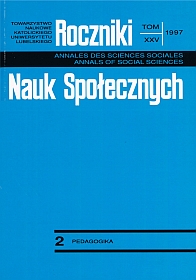Wzmocnienia pozytywne i negatywne w pracy dydaktyczno-wychowawczej nauczycieli
Abstrakt
The author discusses some selected aspects of the problem: punishments-rewards used in the didactic-formative work of teachers. Punishment and reward as negative and positive stimuli make up one of the classes of formative influence commonly used in the school setting. Of the effectiveness of those techniques decide many factors. They concern the teacher’s and the pupil’s traits, the quality of the teacher-pupil relationship, and also the traits connected with stimuli, e.g. kind, frequency, time of application.
The research presented in the paper has been based on poll whose main purpose was to learn the type of rewards and punishments, what kind of pupil’s conduct is rewarded or punished, when and how often rewards are given or punishments inflicted. Twenty teachers from one of the rural schools have been studied, taking into account, when discussing the findings, the seniority and education of the persons under study. The findings are characterized by several tendencies. First, the teachers under study vary punishments to a greater extent than rewards. Supposedly, the positive stimuli are not sufficiently appreciated or used by teachers. The seniority and education is expressly conducive to a greater variety as to the application of both punishments and rewards. For this reason it is important how prepared are young teachers with regard to their profession and methodology. Moreover, there is a tendency noticed in the study as regards the kind of conduct that is being stimulated. The teachers stimulate, first of all, the cognitive approach amongst children. Social behaviours would rank last in the hierarchy of the importance of situations which fell under reward of punishment. The text points to a need and necessity for further research on the ways teachers use positive and negative stimuli in the didactic-formative work of teachers.
Copyright (c) 1997 Roczniki Nauk Społecznych

Utwór dostępny jest na licencji Creative Commons Uznanie autorstwa – Użycie niekomercyjne – Bez utworów zależnych 4.0 Międzynarodowe.


